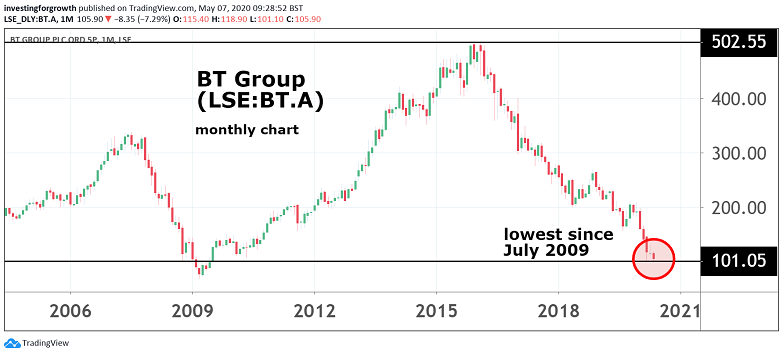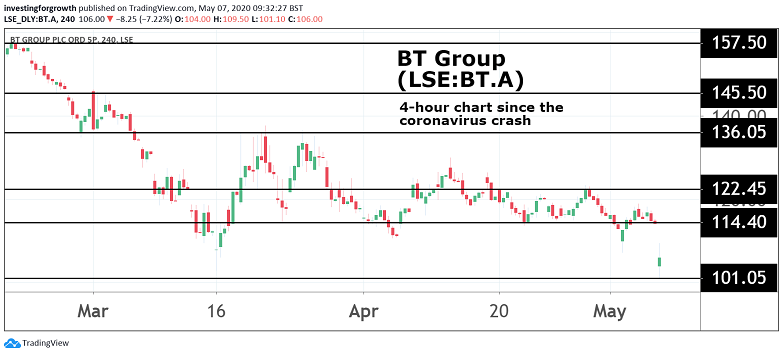BT shares: should investors still own them after dividend scrapped?
One of the last obvious vestiges of the investment case is now removed, argues our head of markets.
7th May 2020 09:41
by Richard Hunter from interactive investor
One of the last obvious vestiges of the investment case is now removed, argues our head of markets.

The question leading up to these results for the year to 31 March 2020 was not if, but by how much, BT (LSE:BT.A) would take a scalpel to its dividend. Coupled with the aim of a major overhaul of its business, investors are now questioning whether the leap of faith required to stay with the shares is viable.
If ever a dividend cut was coming, it was this one, and not just because of the Covid-19 crisis. After all, connectivity is key to companies in normal times, but the current lockdown has underlined the importance of services such as those which BT provides. Not that BT will emerge unscathed, since it has set aside £95 million mainly to reflect increased debtor provisions.
However, even prior to the pandemic, BT had been swimming against the financial currents of the pension deficit and huge expenditure on both 5G and the fibre broadband networks, let alone the cost of the dividend itself.
Net debt remains stubbornly high at around £18 billion and will come under increasing pressure. In suspending the dividend for this year and next, then planning to reintroduce payments at half the current level, additional cash will be made available for BT’s extremely ambitious transformation plan.

Source: TradingView. Past performance is not a guide to future performance.
The objective of gross savings of £2 billion per annum through a blend of modernisation, rationalising of products and abandoning some legacy services, should result in a more efficient operation, although the journey will be fraught with challenges.
Even where BT is coming from a position of strength, such as in the profitable and higher margin Openreach business, the price regulator wants its pound of flesh. The requirement for more internet connections at ever-increasing speeds is a given for the UK consumer, but this also comes with expectations of lower prices.
BT’s largest arm by revenues is the Consumer division, where competition is likely to intensify, with the latest announcement of a potential merger of O2 and Virgin Media providing more food for thought. BT should be well-placed to withstand such an onslaught, however, with the combined elements of its own brand, along with EE and PlusNet providing a formidable defence.
The annual figures to the end of March are largely as expected, with a 2% drop in revenues to £22.9 billion bang in line with expectations and a pre-tax profit of £2.35 billion marginally shy. The company’s ability to generate cash remains prodigious, with lower pension contributions in the period providing something of a tailwind.
- A checklist for finding dividend shares in a crisis
- James Mee interview: dividend strategy and favourite stocks
- Will the other top UK dividend payers follow Shell's lead?
- Take control of your retirement planning with our award-winning, low-cost self-invested personal pension (SIPP)
BT has identified that something radical was required to shake up its business, and the transformation plan could conceivably deliver this if successful.
From an investment perspective, something needs to be done to mollify investors who have seen the share price decline by 75% over the last five years. Even over the last year, the shares have fallen 50%, as compared to a 19% decline for the wider FTSE 100 index, and the initial reaction to these numbers partly reflects that one of the last obvious vestiges of the investment case, the punchy dividend yield has now evaporated.

Source: TradingView. Past performance is not a guide to future performance.
The market consensus of the shares as a 'cautious buy', largely built on hopes of a return to form for the telecoms giant, will come under further scrutiny given the scale of the challenges which lie ahead.
Full performance can be found on the company or index summary page on the interactive investor website. Simply click on the company's or index name highlighted in the article.
These articles are provided for information purposes only. Occasionally, an opinion about whether to buy or sell a specific investment may be provided by third parties. The content is not intended to be a personal recommendation to buy or sell any financial instrument or product, or to adopt any investment strategy as it is not provided based on an assessment of your investing knowledge and experience, your financial situation or your investment objectives. The value of your investments, and the income derived from them, may go down as well as up. You may not get back all the money that you invest. The investments referred to in this article may not be suitable for all investors, and if in doubt, an investor should seek advice from a qualified investment adviser.
Full performance can be found on the company or index summary page on the interactive investor website. Simply click on the company's or index name highlighted in the article.